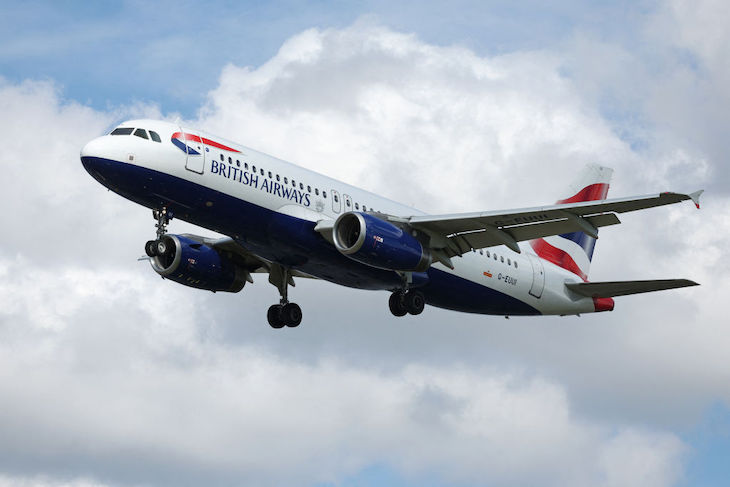It is tempting, confronted with the news that British Airways is to swap out lunch on long-haul flights leaving between 8.30am and 11.29am in favour of a ‘Great British Brunch’, to conclude that flying has simply gone to the dogs. The cost-cutting move, which applies to business and First Class passengers, has raised many an eyebrow, especially as the brunch menu sees the traditional opening sallies of lunch (cheese, artichoke, choice of other appetisers) followed by a gear shift into waffles or eggs and other apparent constituents of the ‘Great British brunch’. Not only is it hard to think of anything less convincingly likely to be done well in the ‘British’ aviation context than brunch, which in modern times is a largely American institution, but the jarring inelegance of this meal construction sets the teeth on edge. And, given that a ticket can cost thousands of pounds, those are expensive teeth to set on edge.
The roasts and the fags and the charm belong to a different era of travel
The soul of commercial aviation has changed beyond recognition. A businessman winging his way around the world in the post-war era would be horrified by today’s interpretation of top-drawer transit. First-class customers on BA’s predecessor BOAC (British Overseas Airways Corporation) were offered full roasts carved to order. This could be part of a six, or seven, course lunch or dinner. Extensive wine lists, and complimentary cigarettes that were offered after take-off and after meals, were the order of the day in the 1950s and 1960s. And we all know that the job description of flight attendants – the stewardesses and stewards of old – included the laborious work of non-stop bespoke charm. Whatever the gentleman or lady wished was her command (especially the gentleman).
The roasts and the fags and the charm certainly belong to a different era of travel, one of analogue glamour, newsprint, pipes and three-piece suits. But in fairness to our more penny-pinching, pedestrian times, the upper class experience is more ergonomic. Indigestion – albeit with a lot of fun and chatter – was suffered in upright if well-cushioned seats. But now the flyer in the front of the plane gets a flatbed and the choice of hundreds or films and television programmes delivered in surround sound through state-of-the-art headphones. The few times I have flown in business I have found that all this, plus champagne and a few decent wines on tap, ensure the experience remains a slice of liminal luxury. It is certainly more suited to our atomised, private sensibilities. The last thing a modern business traveller wants now is the guy next to you smoking and yammering away at you for eight hours as he gets more and more drunk on martinis. Or is it?
A version of that, after all, is what occasionally happens in Economy – the class I am most familiar with. For all its bad press, weird meal services and snippy, charmless young attendants (many straight from Easyjet, as a long-time Club class attendant I know told me in despair recently), BA long-haul is generous on the sauce. It’s not uncommon for one of the more friendly people on meal service – for some reason usually a camp male named Andrew, Ian or Richard – to wink and slide you not one but two mini bottles of gin and tonic before the meal. Then two bottles of wine. And then more if you want it. Seeming drunk might prejudice this incredible availability, but only if the flight attendant notices. If not, and it’s your neighbour availing himself, you are in for a long and tedious flight.
If booze can still be found on our flag-carrier, then the real fall-off in grace with flying today compared to yesteryear is twofold. First, the collapse of the post-9/11 airport experience; second, the downturn in manners and patience – in short, any semblance of customer service – from airline staff. Every time I fly now I feel like there’s always at least one attendant who is sullen, and makes basic questions (‘Could I have some water?’; ‘Is food likely to be served any time soon?’) seem like terrible affronts. On my last flight, from Boston to London, I was sternly told to be careful taking my baby daughter up and down the stairs at the back of the plane, as if I was some random lady, not a mother with a vested interest in not falling on her head, trying to soothe an infant, firmly attached to her in a carrier, on a night flight.
It’s the horror of airports these days that really sickens the spirit
But it’s the horror of airports these days that really sickens the spirit. The degrading, intimidating, physically exhausting gamut of processes from ‘bag drop’ to check in to visa check to security is a true dystopia that puts more than a few older people off flying full stop. That we have to take all our liquids out, potentially missing a flight if a stray vaseline pot gets forgotten, because of an Islamist threat that is ongoing, but which is rarely acknowledged for fear of being accused of ‘Islamophobia’, is an insult I can still barely countenance. Before Islamism was a global force and omnipresent danger, one could really enjoy business travel right from the get-go: turn up, whizz through, shop, have a few champagnes before hopping on your flight.
But before descending too deeply into rose-tinted rage at the present, I am grateful for one thing. Safety, helped along by technological development, is better than it was. Despite the drawbacks, I’d rather fly in an Airbus A380 than the DC8s and TWA Lockheed Constellations that sometimes crashed into each mid-air. So no, flying is not what it was: it’s way drearier, far more banal, infinitely less luxurious and charming. It’s also much more likely to transfer you from A to B alive.








Comments